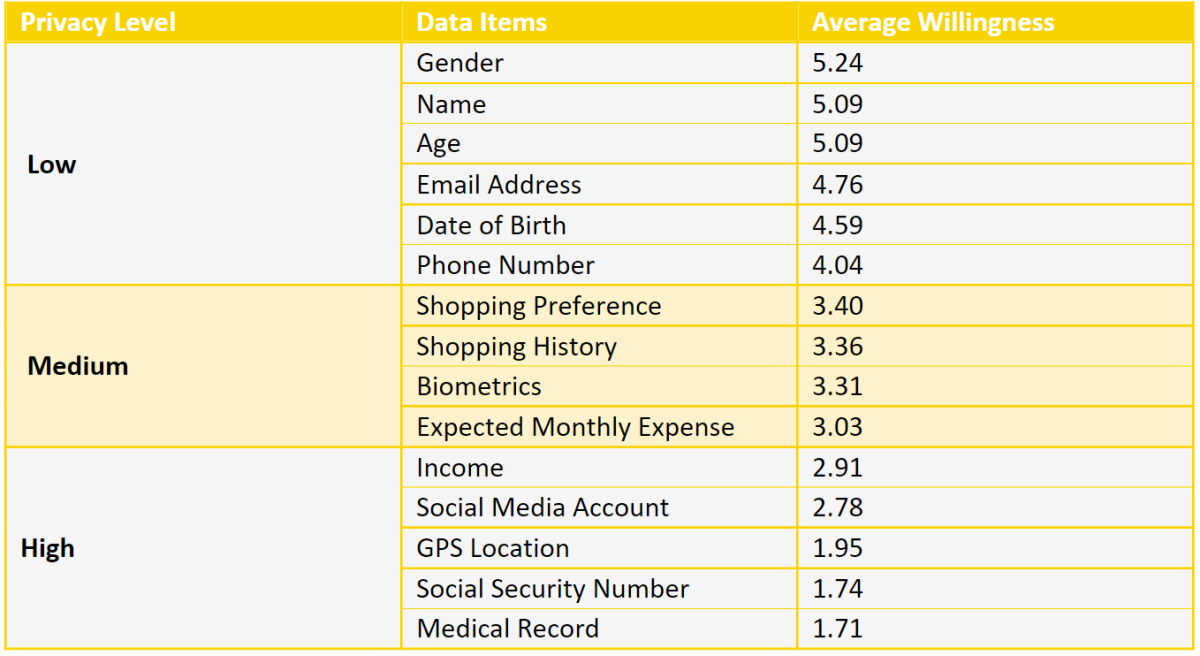Gen Z consumers are more willing to share biometric info than details from their social media accounts with retailers.
A new report from payments platform FreedomPay and Cornell University has found that young consumers are more likely to share personal details if they received a reward in exchange for their data. The effectiveness of this tactic, however, was dependent on the perceived importance of the data. The report has helped uncover valuable insights about Gen Z and how they think about data and their threshold for sharing it.
Gen Z are more reluctant to share personal data with third parties than Millennials are, making it harder for retailers to collect their customer data. While they are privacy-oriented and have clear priorities on what information they wish to share, there are also clear opportunities for retailers and merchants to reach these consumers with the right mix of promotions.
The research is based on a survey of 200 Cornell University Gen Z students, defined as those born in 1995 or later. Data privacy is increasingly top of mind for both regulators and consumers, with more government policies addressing data tracking and sharing.
Survey participants were first asked about their willingness to share 15 different data types, on a scale of one to six from "very unlikely to share" to "very likely to share." These data items were then sorted by low, medium, and high privacy levels.
For instance, gender, name, and age were perceived to have a low privacy level, with an average willingness to share above 5.0. Respondents were also more willing to share their email addresses than phone numbers, with an average willingness of 4.76 to 4.04, although both ranked low on the privacy scale.

The medium privacy level included data such as shopping preference, shopping history, biometrics, expected monthly expense, income, and social media accounts. Gen Z consumers were more likely to share biometric information than their social media accounts, with an average willingness of 3.31 to 2.78.
Data including GPS location, Social Security Number and medical records were associated with high privacy and a low willingness to share.
A £12 reward incentive had the most impact on Gen Zers' willingness to share medium-level privacy details. The reward made these consumers 27 percent more likely to share medium-privacy information, such as biometrics or shopping history, and 24 percent more likely to share high-privacy data such as medical history.
The monetary reward had the most minimal impact on low-privacy data, providing an 11 percent boost. The discrepancy is likely in part because most consumers are already inclined to share details such as their gender and name.
When offered a reward Gen Zers’ willingness to share data increase across the three privacy categories:
- 11% more likely to share low-privacy data
- 27% likely to share medium-privacy information
- 24% more likely to share high-privacy data
Additionally, the research revealed preferences in terms of the rewards offered for sharing information:
- Participants prefer cash discounts to loyalty points (at 69% and 31% respectively)
- They are likely to choose loyalty points if that value is 20x greater than cash discount value
- For those Gen Zers who prefer loyalty points, food & beverage was the most preferred category (at 44%)
- The least popular options include debit cards, petrol, grocery stores, and the hospitality industry
- Other participants were likely to choose food & beverage and retailers equally
Other reward incentives were also evaluated, with respondents preferring a cash discount to loyalty points at a rate of 69 to 31 percent, respectively.
To encourage consumers to opt for points, a brand or retailer would need to offer loyalty points valued at 20 times greater than the cash discount. Those who prefer loyalty points are most likely to redeem them in the food and beverage industry.
Consumer data is crucial for brands and retailers looking to learn more about shoppers and leverage more personalized offerings.
When it comes to ecommerce, brands and retailers are hampered because their owned sites do not offer the convenience, customer history or data-driven recommendations that Amazon or search engines like Google offer, according to a report from Search Platform Coveo.
Shoppers are not making it easy on retailers, as many expect both privacy and personalisation. Nearly six in ten consumers are concerned about how their data is being used by retailers and 40 percent remain anonymous during checkout.
As Generation Z highly values data privacy but shows a willingness to exchange data containing limited personal information for monetary rewards, this presents an opportunity for companies like FreedomPay to generate value from data to better serve both retailers and consumers alike.
Download Effects of Monetary Rewards and Data Privacy Levels on Generation Z’s Willingness to Share Personal Data here.
To find out more about FreedomPay and the services they provide to the retail industry, click here.
This article was also published in The Retailer, our quarterly online magazine providing thought-leading insights from BRC experts and Associate Members.
